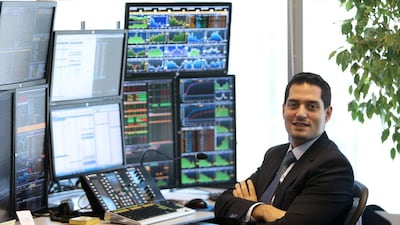Name: Adel Merheb
Job title: Director, equity capital markets, Shuaa Capital
Years investing: 10
Based: Dubai
What is the asset class and geography you are focused on?
My focus is on Arabian Gulf equities, mainly the UAE, Saudi Arabia and Qatar, but I look at global macro as an integral part of the analysis. The relationship between Gulf and global equities can be tight at times [and] that requires a proper understanding of the global scene. Also, asset classes tend to be linked. So, for example, movements in oil prices such as the ones we have seen in the recent past can have a great impact on Gulf as well as global equities.
What is the outlook for the month ahead?
For some time, regional equities were being driven by their internal dynamics. For example, we saw the UAE stocks rally ahead of the MSCI upgrade earlier in the year, while Saudi Arabia rallied on the decision of opening the market to direct foreign ownership. In the past few months, however, the region seemed to be more affected by developments in international markets. The steep fall in oil prices and the correction we saw in the United States and global equity markets in October were the primary drivers behind the recent performance in regional stocks and it looks like Gulf markets will remain hostage to global developments in the near term. That said, and barring any major sell-off in global equities, chances are high that we see Gulf stocks try to catch up to the strong recovery that US equities have experienced since their lows in October.
What are the main risks, either upside or downside, to the outlook?
Although the geopolitical situation is always cited as an obvious risk in the Gulf, it is something that investors seem to be aware of and somewhat accustomed to. It is unexpected events that actually form the biggest threat and the steep fall in oil prices is one of them. Not only are the economies and government budgets in the Gulf heavily dependent on high oil prices, but a continued slide in the black gold has the impact of shocking global equity markets as well. It is important that we see a rebound or at least some stabilisation in oil prices or else we will be up against a material threat to the bull market we have seen in global and regional equities in the past two years. Any sustainable pressure on oil prices will trigger deflationary fears and there is nothing that equity markets hate as much as deflation.
What is the best investment at the moment?
Whenever you consider an investment, it is imperative that you take into account the time frame for that investment. The United States, and probably global, equities have been the place to be since 2009 and my argument since 2010 has been that equity markets in the United States and across most countries in the world were in a secular bull. Today I continue to believe that equities are the place to be and that every shock – such as the one we saw in October – will probably prove to be a great buying opportunity. I think this bull run in equities has probably two to three years left in it. Simply put, equities remain our favourite asset class and we would view sell-offs as buying opportunities.
What was the best investment you were ever involved in?
By far, it was the gold trade I took in 2005 when it was still trading around US$400. I was working at a hedge fund that looked into US equities and options at the time, and we used to do quite a bit of trading on gold ETFs [exchange-traded funds] and futures. I was able to ride the wave up to $1,250, which proved to be super-lucrative, especially when you take in the inherent leverage in the contracts I traded. Gold went up all the way to $1,900 before falling back to $1,150.
What was the worst?
It was the exposure I had to the UAE equities in 2008. I had positions in some of the actively traded stocks on the Dubai Financial Market, and although I was disciplined enough to stop my losses at the 10 per cent mark, I was leveraged and my total hit was closer to 18 per cent.
ssahoo@thenational.ae

